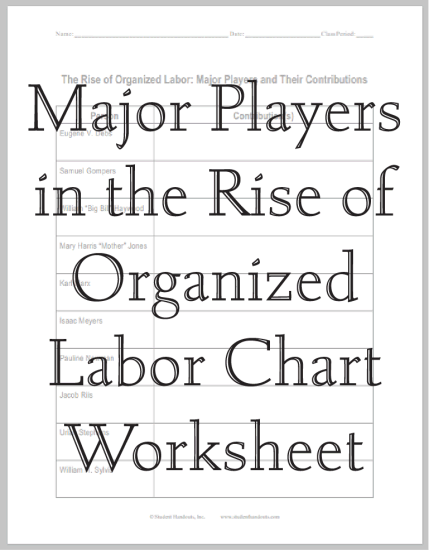Major Players in the Rise of Organized Labor Blank Chart |
|---|
| www.studenthandouts.com > U.S. History > Discontent and Reform > Worksheets |
 |  |
|---|
Students are asked to complete this chart, describing the contributions of the following to the rise of organized labor: Eugene V. Debs, Samuel Gompers, William "Big Bill" Haywood, Mary Harris "Mother" Jones, Karl Marx, Isaac Meyers, Pauline Newman, Jacob Riis, Uriah Stephens, and William H. Sylvis. Click here to print (PDF). Answers will vary. These individuals made significant contributions to the rise of organized labor in the United States. Eugene V. Debs: Debs was a prominent labor leader and a founding member of the Industrial Workers of the World (IWW). He played a crucial role in organizing railway workers and promoting the rights of laborers. Samuel Gompers: Gompers was a key figure in the American labor movement and served as the first president of the American Federation of Labor (AFL). He advocated for workers' rights and successfully negotiated labor agreements with employers. William "Big Bill" Haywood: Haywood was a leader in the Western Federation of Miners and a co-founder of the Industrial Workers of the World (IWW). He was known for his radical approach to labor organizing. Mary Harris "Mother" Jones: Mother Jones was a passionate advocate for workers, particularly miners and children. She organized labor strikes and fought for better working conditions and child labor laws. Karl Marx: Although not American, Marx's writings on class struggle and socialism had a profound influence on the ideology of many American labor leaders and movements. Isaac Meyers: Meyers was a founder of the Colored National Labor Union, which sought to address the specific labor concerns of African American workers during the post-Civil War period. Pauline Newman: Newman was a labor organizer and suffragist who fought for the rights of women workers. She was involved in the International Ladies' Garment Workers' Union. Jacob Riis: Riis, a journalist and social reformer, exposed the harsh living conditions of the urban poor through his writings and photographs, bringing attention to the need for labor and housing reforms. Uriah Stephens: Stephens was a co-founder of the Knights of Labor, one of the earliest national labor unions in the United States. The Knights advocated for workers' rights and labor reform. William H. Sylvis: Sylvis was a leader in the Iron Molders' Union and a founder of the National Labor Union. He promoted the idea of an eight-hour workday and the protection of workers' rights. These individuals played critical roles in advocating for workers' rights, organizing labor movements, and improving working conditions during a period of significant industrialization and social change in the United States. |
|---|
| www.studenthandouts.com > U.S. History > Discontent and Reform > Worksheets |









